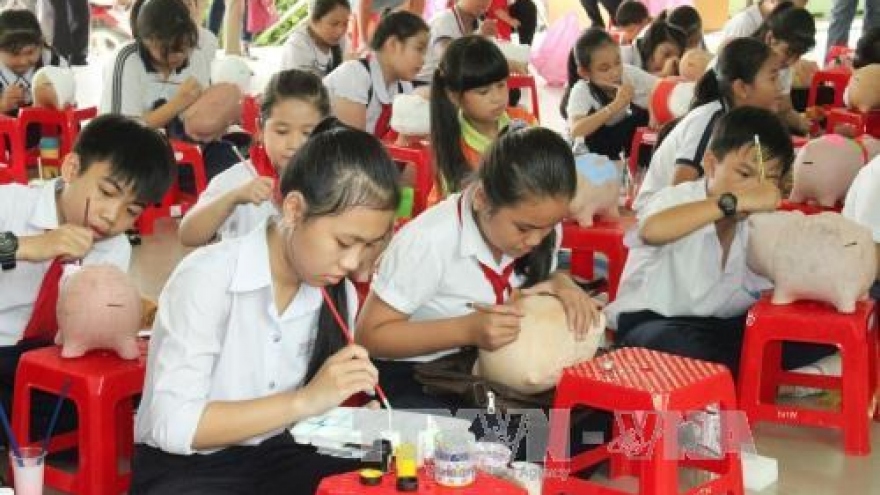Human trafficking – don’t gamble with your future
VOV.VN - Vietnam is a strategic partner for the UK in many fields such as trade, education, and defence.
 |
| British Ambassador to Vietnam Gareth Ward. (Source: British Embassy) |
One of those issues is human trafficking and illegal migration. Young and vulnerable Vietnamese are being trafficked to the UK to work in illegal and dangerous activities, for the benefit of organised crime gangs. Many people in Vietnam are not aware of this issue. I would like to change that by sharing information with you about how this human trafficking takes place.
When I talk about human trafficking, you may think about Vietnamese being forced to go to China or neighbouring countries like Laos and Cambodia. In fact, Vietnamese people are not only trafficked to countries sharing land borders, but also to developed countries in Asia such as Thailand, the Republic of Korea, and Malaysia, and even to Europe.
In the UK, we also talk about ‘modern slavery’, because many victims of trafficking are forced to work in terrible conditions, sometimes with physical or sexual abuse. In recent years, hundreds of potential Vietnamese victims of trafficking have been identified in the UK.
Unlike victims of trafficking to neighbouring countries, who are often tricked or even kidnapped, Vietnamese arriving illegally the UK have usually left voluntarily, believing that they will arrive in the ‘promised land’, to earn money to improve the economic situation for themselves and their families. Many of them are from poor provinces of Vietnam of Nghe An, Ha Tinh and Quang Binh.
These people approach or are approached by relatives or friends whom they heard have successfully taken someone to UK. They pay huge amounts of money, which they get from mortgaging houses, gardens, or boats. They borrow from loan sharks to pay brokers and smugglers to take them illegally across borders. Thus, right from the beginning of their journey from Vietnam, they put their lives in the hands of criminals.
Criminal gangs profit hugely from selling fake documents and taking people across borders illegally. According to our information it costs from 30,000 USD to 50,000 USD to go illegally to the UK.
This may be by using fake documents on a flight, or more commonly, is a long and risky road journey across many European countries. Most victims of trafficking think that despite the dangers and the costs they will find a life changing opportunity in the UK to pay back debts. Sadly this is far from the truth.
I had the opportunity to hear the story of a Vietnamese who went to the UK illegally. It was a nightmare journey: first from Vietnam to China, and then for a month in the cold travelling across Russia, Poland, Germany, France; and finally hiding in a truck crossing the border from France to UK. He said he was one of those lucky to survive. There are cases of illegal immigrants suffering injuries when being chased. There are cases of death due to extreme cold, lack of oxygen inside lorries. Many never even set foot in the 'promised land’.
What awaits those who do arrive in the UK illegally after a long and arduous journey? As illegal immigrants, with the burden of debts and the hopes of their loved ones in Vietnam, they do whatever it takes to gets shelter and money. Without valid papers, they work illicitly. Criminal gangs, taking advantage of their vulnerability and fear of being discovered by the authorities, pay them low wages and force them to work long hours knowing for sure that no one will dare complain. This type of exploitation is what we call ‘modern slavery’.
Temporary jobs such as manicuring, babysitting, or hotel cleaning may sound attractive, but when done illegally they have very low wages.
Many illegal immigrants are pressured to work in drug cultivation or prostitution to make money to pay off debts.
Cannabis cultivation is dangerous and exploitative, with the fear of being robbed or beaten by gangs, as well as being arrested and deported. The houses used for cannabis farming have their windows locked shut so that no light or smell can get out. Young Vietnamese are forced to live indoors for weeks on end - trapped in these conditions they suffer serious health risks, both for respiratory and mental health.
The UK welcomes those who come to the UK legally, to visit to study and to work in skilled jobs, in line with our laws. But do not listen to those who tell you that they can get you to the UK through the back door and help you to make money working illegally. Don’t gamble with your future. They are not friends. They are criminals. If you go with them you put yourself and your family at risk. They take advantage of illegal immigrants to force them into dangerous work, and keep the profits for themselves. Human trafficking is closer than you think. Be aware of the risks, don’t be a victim!
British Ambassador to Vietnam Gareth Ward


